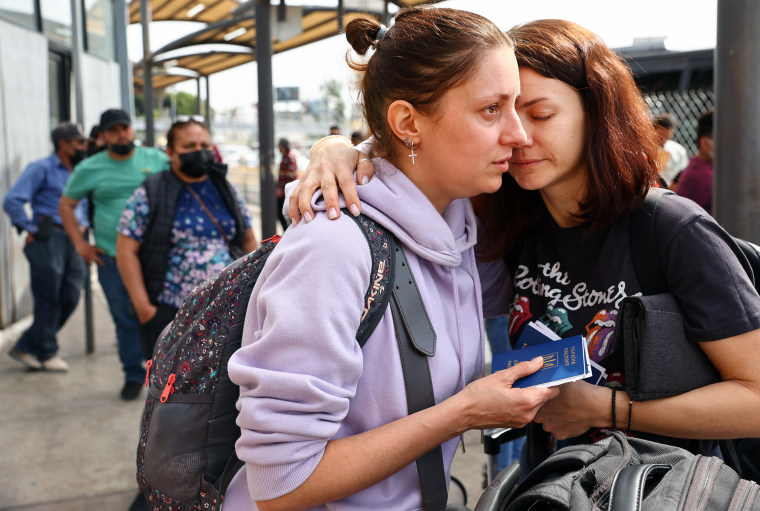The Biden administration is preparing to unveil as early as this week a plan to expedite and streamline the resettlement of some Ukrainian refugees in the U.S., three sources familiar with the plan said.
The plan would allow vulnerable Ukrainians, specifically activists, journalists and those who are part of the LGBTQ community, to safely enter the U.S. at least temporarily. It would also expedite the reunification of Ukrainians with U.S.-based family members, the sources said.
The exact authority President Joe Biden would use to speed the passage of Ukrainians remains unclear, the sources said. The White House is considering both humanitarian parole, a presidential authority that does not guarantee permanent legal status, and the Priority-2 designation program, which has been used for Afghans and others escaping war zones, they said.
White House national security adviser Jake Sullivan said Tuesday that Biden “will announce further American contributions to a coordinated humanitarian response to ease the suffering of the civilians inside Ukraine and to respond to the growing flow of refugees.” The White House declined to comment on the specifics of the plans.
White House press secretary Jen Psaki said Monday that Biden will thank Polish President Duda on his coming trip to Europe for Poland’s role in taking in refugees and “talk about what we can do to continue to provide support.” Psaki also said internal discussions continue at the White House about what more can be done to welcome refugees.
Last week, Psaki said the Biden administration will welcome Ukrainian refugees but expects the majority will want to stay in Europe.
Mark Hetfield, the president and CEO of HIAS, a Jewish American humanitarian organization, said groups like his have urged the administration to offer Ukrainians full protection to live and work in the U.S.
“Overall we’ve been urging that they not bring in refugees the way they brought the Afghans in — via humanitarian parole without any pathway to assistance, status or family reunification,” Hetfield said. “They should bring in Ukrainians the way they brought in Kosovars from Macedonia in 1999 — finalizing the refugee adjudication after they get to the U.S., to ensure they have all the protections to which they would be entitled as refugees.”
Biden administration officials say they believe most Ukrainians wish to eventually return to their homes and will therefore choose to seek safety in Europe, the sources said, so plans to bring them to the U.S. permanently may not be necessary.
Since Russia invaded Ukraine last month, more than 3 million Ukrainians have fled their homes. The U.S. has pledged to help them, but so far thousands are reported to have resorted to trying to cross the U.S. southern border to claim asylum — a dangerous process that does not guarantee a safe passage or permanent protections.
Immigration advocates have called on the administration to help not only Ukrainians but also Central American and Haitian migrants who have been repeatedly turned back at the border under Title 42, a policy put in place by the Trump administration to stop the spread of Covid.
Unlike asylum-seekers who present themselves at border stations, refugees with official status who are resettled in the U.S. are flown in legally and usually given support services to begin a new life.
Although the Biden administration granted Temporary Protected Status to Ukrainians, it only applies to those who were in the U.S. on March 1, just after Russia’s invasion began Feb. 24.
Although Biden set a goal of resettling 125,000 refugees in the U.S. from all countries this fiscal year, fewer than 7,000 have been resettled in the first five months, according to refugee resettlement agencies.
The Obama administration set a target to accept 10,000 Syrian refugees in fiscal year 2016 as civil war ravaged Syria, and he met that goal ahead of schedule.

